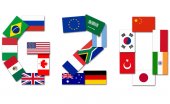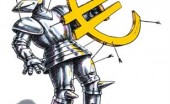Johannah Bernstein post: "eternally proud of my father’s extraordinary aeronautical engineering. legacy. here is a photo of the Canadair Water…
Sarkozy, the European Central Bank and Gettysburg
Written by Diana Thebaud Nicholson // October 2, 2007 // Economy, Geopolitics // Comments Off on Sarkozy, the European Central Bank and Gettysburg
By George Friedman
Last week, French President Nicolas Sarkozy attacked the policies of the European Central Bank (ECB), saying that they are hurting France. He particularly criticized the ECB’s interest rate policy, saying the bank has deliberately let the euro rise relative to the dollar. And he criticized the simultaneous injection of liquidity into the markets, saying it saves speculators but does not help business by lowering interest rates. As Sarkozy put it, the ECB policies mean that, as far as the French are concerned, “We sink.”
The sinking that Sarkozy is referring to is his own plan to liberalize the French economy, and thus make it more dynamic. In order to achieve his goal, he needs lower interest rates to facilitate entrepreneurial activity as well as general business expansion — and he needs a cheaper euro to facilitate French exports. Sarkozy sees his vision for France under his presidency as being undermined by the ECB, whose policies are in many ways more important to the French economy than anything Sarkozy might plan. The ECB is simply pursuing a different policy.
That is, of course, what central banks are supposed to do. Their independence from politics is supposed to guarantee that, rather than satisfy fleeting political passions, they follow policies that are in the best interest of the country from a strictly economic view. It is not a bad idea. It can be defended as part of the process of a republic, because the governors of the bank are appointed by representatives of the people. Even so, it places a great power in the hands of people whose wisdom must be assumed.
As complicated as the idea of a central bank is in a democracy, it is further complicated in Europe by the question of exactly which country the ECB is supposed to be serving. Europe is not a country, but a federation of sovereign nations that are said to have a single economy. But while Europe is highly integrated, any one country — its people and its elected government — may be interested in pursuing divergent economic policies.
Full story

